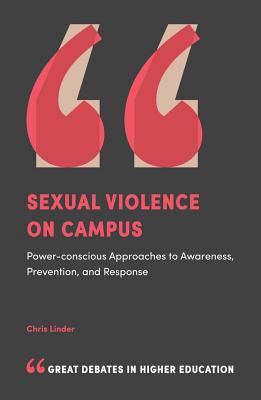
- Afhalen na 1 uur in een winkel met voorraad
- Gratis thuislevering in België vanaf € 30
- Ruim aanbod met 7 miljoen producten
- Afhalen na 1 uur in een winkel met voorraad
- Gratis thuislevering in België vanaf € 30
- Ruim aanbod met 7 miljoen producten
Zoeken
Sexual Violence on Campus
Power-Conscious Approaches to Awareness, Prevention, and Response
Chris Linder
€ 69,45
+ 138 punten
Omschrijving
Activists have been working to call attention to the problem of campus sexual violence for decades, and in recent years, policymakers, campus administrators, and researchers have begun to make serious efforts to address this issue. Despite this increase in attention, many campus leaders still struggle to effectively address campus sexual violence, often over-relying on policy to address sexual violence after it happens, rather than working to prevent it from occurring in the first place. Moreover, rates of sexual victimization on college campuses have not changed in 60 years, highlighting the need for a change in action, training and behaviour.
The root of sexual violence is power oppression, yet most policies and practices are based on identity- and power-neutral perspectives. Well-intended prevention efforts frequently focus on teaching potential victims how not to get raped, rather than teaching potential perpetrators not to rape. Further, most policies, practices, and research focus on only one type of victim of sexual violence: a white cisgender heterosexual college woman.
Strategies that fail to account for the ways sexual violence and power intersect cannot deliver effective solutions. Based on a wide-ranging review of research, combined with her 10 years' of experience as an educator and co-ordinator of services for survivors of campus sexual violence, Chris Linder advances a power-conscious lens to challenge student activists, administrators, educators, and policy makers to develop more nuanced approaches to sexual violence awareness, response, and prevention on college campuses.
The root of sexual violence is power oppression, yet most policies and practices are based on identity- and power-neutral perspectives. Well-intended prevention efforts frequently focus on teaching potential victims how not to get raped, rather than teaching potential perpetrators not to rape. Further, most policies, practices, and research focus on only one type of victim of sexual violence: a white cisgender heterosexual college woman.
Strategies that fail to account for the ways sexual violence and power intersect cannot deliver effective solutions. Based on a wide-ranging review of research, combined with her 10 years' of experience as an educator and co-ordinator of services for survivors of campus sexual violence, Chris Linder advances a power-conscious lens to challenge student activists, administrators, educators, and policy makers to develop more nuanced approaches to sexual violence awareness, response, and prevention on college campuses.
Specificaties
Betrokkenen
- Auteur(s):
- Uitgeverij:
Inhoud
- Aantal bladzijden:
- 184
- Taal:
- Engels
- Reeks:
Eigenschappen
- Productcode (EAN):
- 9781787432291
- Verschijningsdatum:
- 21/05/2018
- Uitvoering:
- Paperback
- Formaat:
- Trade paperback (VS)
- Afmetingen:
- 129 mm x 198 mm
- Gewicht:
- 199 g

Alleen bij Standaard Boekhandel
+ 138 punten op je klantenkaart van Standaard Boekhandel
Beoordelingen
We publiceren alleen reviews die voldoen aan de voorwaarden voor reviews. Bekijk onze voorwaarden voor reviews.











